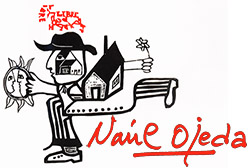Ojeda's woodblock prints are notable for their iconic suns, moons, fish, floating figures, and the sea. His work is lyrical and he has been described as a visual poet. Indeed, many of his prints include the figure of a hovering poet-observer, usually sporting a hat. He was a lover of poetry and created many prints incorporating poetry and graphics, particularly the poems of Pablo Neruda.
Naúl Ojeda was represented by the Franz Bader Gallery in Washington, DC from the late 1970s through the early 1990s. His work has been exhibited widely in the U.S. and internationally and is represented in private collections as well as the collections of the Smithsonian American Art Museum and the Art Museum of the Americas, in Washington, DC, the Museum of Modern Art in New York, and the National Hispanic Cultural Center in Albuquerque, New Mexico. Ojeda’s prints were commissioned frequently by The Washington Post, the University of Chicago Press, Curbstone Press, Americas Magazine, the Institute for Policy Studies, and others. He received numerous awards, including fellowships from the D.C. Commission on the Arts and Humanities and the Distinguished Immigrant Award 2001 from the American Immigration Law Foundation.
Naúl Ojeda died on June 6, 2002, in Washington, DC, two days after the opening of an exhibition of his paintings. The Estate of Naúl Ojeda is comprised of approximately 150 hand pulled woodcuts and linocuts, an assortment of figurative watercolors and acrylics, well as abstract paintings that he never exhibited. The latter were the artist’s escape from the discipline of the precise carving and printing of the woodblocks. In addition, the Estate holds approximately 150 of his carved blocks and approximately 1,000 negatives of photos taken in Chile during the early 1970s covering the campaign, presidency and coup d’etat of Chilean President Salvador Allende.
